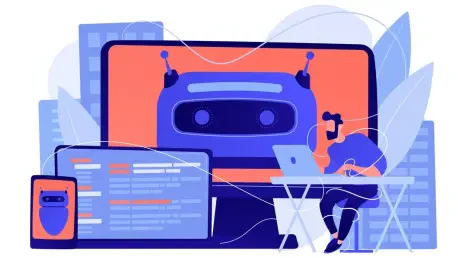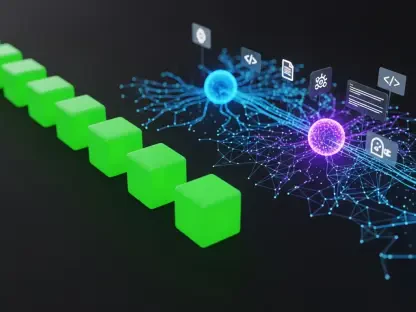The Rise of AI in Software Development
The software development industry stands at a pivotal moment where artificial intelligence has become a cornerstone of modern workflows, reshaping how code is written and projects are delivered with unprecedented efficiency. AI integration is no longer a novelty but a fundamental component, with tools designed to assist developers in navigating complex coding challenges. This transformation is driven by the urgent need to meet market demands for faster, more innovative solutions, pushing organizations to adopt technologies that streamline processes and enhance productivity.
AI code assistants have emerged as critical allies in this high-stakes environment, enabling teams to shorten delivery timelines without compromising on quality. These tools tackle repetitive tasks, suggest optimized code, and minimize errors, addressing the pressure to innovate rapidly. Major players like IBM and GitHub are at the forefront, championing AI adoption through platforms and assistants that leverage cutting-edge advancements in machine learning and natural language processing, setting new standards for productivity.
Beyond individual tools, the broader trend of automation in competitive markets underscores the growing reliance on AI to maintain an edge. The scope of these technologies extends from basic code generation to complex debugging, making them indispensable across various development stages. As organizations strive to outpace competitors, AI’s role in transforming software creation into a more agile, responsive process continues to expand, signaling a profound shift in industry dynamics.
Quantifying the Impact of AI Code Assistants
Time Savings and Productivity Gains
One of the most tangible benefits of AI code assistants lies in their ability to save developers significant time by automating mundane, repetitive tasks. Functions such as generating boilerplate code, identifying bugs, and suggesting fixes are handled with remarkable speed, reducing the manual workload. According to a notable IBM survey, 41% of developers report saving between one and two hours daily, a figure that highlights the potential for massive efficiency gains across teams.
Real-world applications further illustrate this impact, with tools like IBM’s watsonx Code Assistant slashing the time required for code summarization by over 90%, from minutes to mere seconds per file. Such dramatic reductions free up developers to focus on strategic priorities rather than routine maintenance. This shift not only boosts individual productivity but also enhances the overall pace of project completion, aligning with tight market deadlines.
The time saved through AI assistance is often redirected toward higher-value activities, such as brainstorming innovative features or collaborating on system architecture. This reinvestment fosters a culture of creativity and problem-solving, elevating the quality of output. As developers spend less energy on trivial tasks, their capacity for tackling complex challenges grows, driving meaningful progress within their organizations.
Scalability and Organizational Benefits
When scaled across larger teams, the time savings from AI code assistants translate into staggering figures that can redefine operational efficiency. Consider a hypothetical organization with 1,000 developers, each saving just 200 hours annually through AI tools; this equates to a collective 200,000 hours saved, or over 22 years of work time. Such numbers reveal how AI can fundamentally alter resource allocation, allowing firms to prioritize critical initiatives over routine coding.
Case studies provide concrete evidence of these benefits, with companies like rKube automating 80% of their WebSphere application code transformation using AI during a proof of concept, significantly accelerating modernization efforts. Similarly, Westfield reported saving 150 development hours in just eight weeks during an application update pilot. These examples demonstrate how AI drives project acceleration and enhances organizational agility on a practical level.
Looking ahead, the potential to harness these savings for competitive advantage is immense, provided there is robust governance in place to manage risks. Organizations that strategically integrate AI can reallocate human capital to innovation-driven tasks, positioning themselves as market leaders. This forward-thinking approach to scalability underscores the transformative power of AI in reshaping not just workflows but entire business models.
Challenges in Adopting AI Code Assistants
Despite the clear advantages, adopting AI code assistants is not without hurdles, as skepticism about their reliability persists among some developers. Concerns over the accuracy of generated code and the risk of introducing subtle errors can create hesitation, especially in high-stakes projects. This wariness is compounded by fears of over-reliance, where teams might lean too heavily on AI, potentially diminishing critical thinking skills over time.
Technological barriers also pose significant challenges, particularly in integrating AI tools seamlessly into existing development environments. Compatibility issues with legacy systems or the need for customized configurations can slow down adoption, requiring substantial upfront investment in training and setup. Moreover, the necessity for human oversight remains paramount to catch errors or biases that AI might overlook, adding a layer of complexity to implementation.
To navigate these obstacles, organizations must establish clear guardrails and promote a balanced approach to AI usage. Encouraging a culture where AI serves as a supportive tool rather than a sole decision-maker can mitigate risks while maximizing benefits. By investing in training programs and fostering collaboration between human expertise and machine assistance, companies can address skepticism and build confidence in these transformative technologies.
Governance and Ethical Considerations
As AI code assistants become more embedded in development processes, the importance of governance frameworks cannot be overstated. Structured policies are essential to ensure responsible usage, preventing misuse or unintended consequences that could undermine project integrity. These frameworks must address accountability, defining who is responsible for AI-generated outputs and how errors are managed within teams.
Compliance with data security and privacy standards is another critical aspect, especially when handling sensitive or proprietary code. Organizations must implement strict protocols to safeguard information, ensuring that AI tools adhere to regulatory requirements and protect against breaches. This focus on security is vital for maintaining trust and preserving the confidentiality of intellectual property in a digital landscape.
Ethical considerations also play a significant role in shaping industry practices, with transparency emerging as a key factor in building confidence among stakeholders. Developers and organizations alike need assurance that AI systems operate fairly and without hidden biases, which requires open communication about tool capabilities and limitations. By prioritizing ethical guidelines alongside governance, the industry can foster a sustainable environment for AI integration that benefits all parties involved.
The Future of AI in Development Workflows
Emerging trends point to an increasing dependence on generative AI for coding, with the potential to disrupt traditional development models entirely. These advanced tools are evolving to handle more complex tasks, from designing full application architectures to predicting user needs, indicating a future where AI plays an even more central role. This shift promises to redefine how software is conceptualized and built, pushing boundaries beyond current expectations.
Consumer demand for faster, high-quality software continues to fuel AI adoption, as businesses strive to meet expectations in a dynamic market. End users now anticipate rapid updates and seamless experiences, placing pressure on developers to deliver at unprecedented speeds. AI’s ability to accelerate cycles while maintaining standards positions it as a linchpin in satisfying these evolving preferences, ensuring companies remain responsive to customer needs.
Innovation, global market forces, and technological advancements will further shape the trajectory of AI-augmented development. As competition intensifies across borders, organizations that embrace cutting-edge solutions are likely to gain significant advantages. The interplay of these factors suggests a landscape where AI not only enhances efficiency but also drives groundbreaking approaches, setting the stage for a new era in software creation.
Conclusion and Strategic Recommendations
Reflecting on the insights gathered, it becomes evident that AI code assistants have already proven their worth by saving developers thousands of hours and amplifying productivity across various scales. This transformation marks a turning point for the industry, as organizations harness automation to meet pressing demands. The evidence from data and real-world applications paints a picture of profound impact, reshaping how development teams operate in competitive arenas.
Moving forward, the focus shifts to actionable strategies for maximizing these benefits while addressing inherent challenges. Companies are encouraged to balance automation with human expertise, ensuring that AI serves as a complement rather than a replacement for critical judgment. Investing in robust governance structures emerges as a priority to manage risks and uphold ethical standards, safeguarding trust in these tools.
Additionally, embracing AI as a catalyst for innovation and growth stands out as a vital step for long-term success. Organizations that view these assistants as strategic assets rather than mere utilities position themselves to lead in a rapidly evolving market. By fostering adaptability and committing to continuous learning, businesses can unlock the full potential of AI, paving the way for sustained progress and resilience in the face of future uncertainties.









